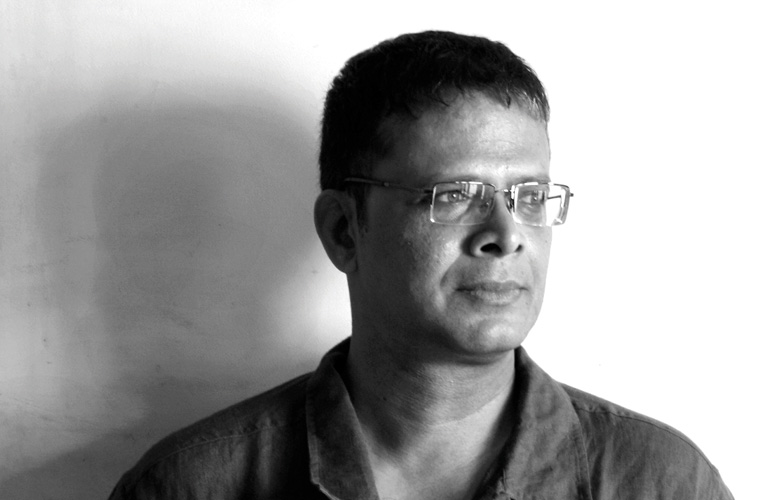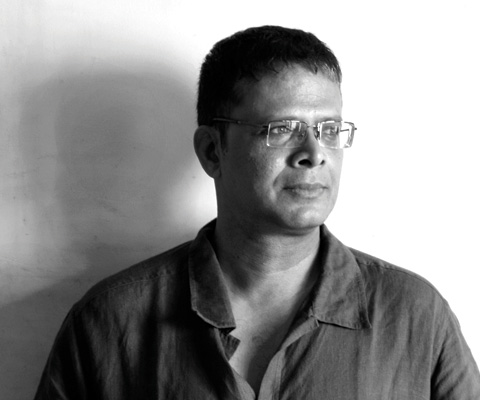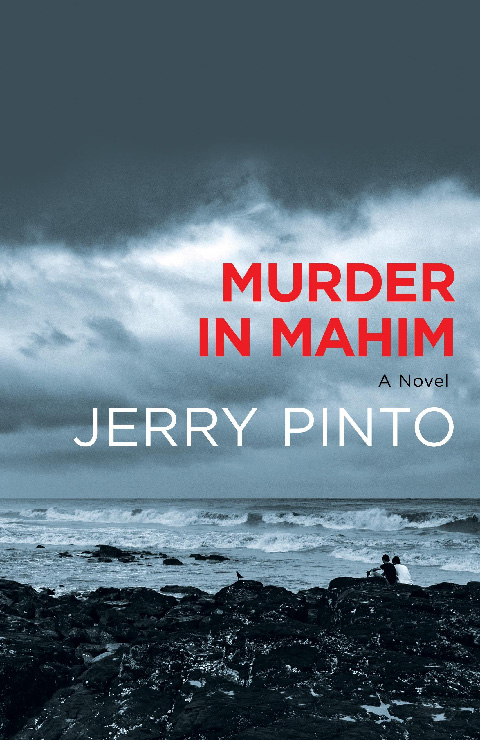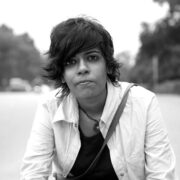Novelist, editor, journalist, teacher—Jerry Pinto has answered to many callings, and they all seem to slip into the canvas of his fiction.
He brings in the rumination of the average city dweller and elevates it into wisdom. There’s an earnest attempt to challenge conservatism, especially notions that rip personal freedoms. He also seems to know silent worlds like no other—and how to unravel them with poignancy. More than anything else, though, there’s always an intent, a noble one, behind his stories. In his latest novel Murder in Mahim, he attempts to peel the layers off sexuality by illustrating a landscape that has eluded even the most enlightened of discourses on the subject.
Read on for an exclusive interview with the author—

Jerry Pinto. Photograph by Chirodeep Chaudhuri.
From Em and the Big Hoom to Murder in Mahim: they are both very different books on the surface, but there seems to be a similarity of intent… to bring to life those invisible worlds that are part of the everyday.
Thank you, Niharika. It had not occurred to me to think of the two books in this way but you are right. We have so little real conversation that when we do start one, we are almost always terrified of the repercussions, to the challenges to who we are and to what we believe. We want most of all to believe that everything is alright, that everything is the way it should be. The mentally ill and the sexually anomalous present challenges that must be negotiated on a daily basis. Most of the time we deal with these in silence. I understand that silence but I can’t say I am very fond of it.
Do you think some lives are susceptible to this invisibility in a city like Mumbai?
I think that a lot of what we do is a struggle against invisibility. As a baby, as a toddler, most children find the world of the family self-sufficient. Knowing no other models, they accept even the dysfunctional as the norm. For most middle-class children, the break comes with school: the sudden realisation that you are one among many; that your individuality and your centrality is only a myth nurtured by the family. Even the school uniform renders the body invisible; it standardises you. Fashion has that habit too; we fight to fit in, we fight to stand out within that matrix. I think Mumbai offers a potent challenge to everyone who comes here or is here. We all have this moment when you get down at Churchgate station or Dadar station and you’re swallowed up in that tide of humanity. It makes you aware that you belong to a great, big, pulsating, and lively city but it is also a city that can swallow you up.
I loved how Murder in Mahim stands against a current tide—the obsession with naming/ identifying/ labelling. The characters in the book seem less interested in doing that, if at all. Is this an elite preoccupation, then?
I think the need to name things is a human thing. It is a power thing to be able to name something. Every time a person from community A talks about how they cook X with Y and call it P, a person from community B will say that they do pretty much the same thing except they call it R. As soon as it has been established that there is a cognate and it has a name, we can accept the otherness of P because it has been shown to be R. The terror of memory loss is also bound up in the losing of the ability to name things. When you give up voluntarily the desire to label, to box, to pigeonhole, it is generally because you have been brought face-to-face with the way in which people elude categorisation. But it is never something you can wholly escape and almost every new crisis throws up new names and new oppositions. So I don’t know about it being an elite preoccupation; I think of it as being a human preoccupation and I see it as my offence as well. I am ruthless when it comes to conservatism of different kinds but I recognise this and I have been trying to deal with it.
There’s a mild disdain for Bollywood in the novel—its excesses. But the plot was nothing less than a rollercoaster for me.
I have a great love of Bollywood but I cannot love uncritically. It is this which makes it possible for me to see how easy it is to get things wrong, how easy it is for them to let themselves down. But that doesn’t mean one cannot learn from their strengths. Bollywood is plot-driven but in general popular/ populist cinema anywhere in the world is because it cannot stop for introspection. And the only way to represent introspection is the voiceover or the conversation; and cinema has always been suspicious of words, although it is reliant upon them too.
Why did you think of using a murder mystery to expose this underbelly of sexual activity that defies assumptions?
I feel we often talk to ourselves about the things that matter. This is because these are such dangerous times that we often feel we do not dare to say what we think in mixed groups for fear of repercussions. These can range from being arrested to being ostracised to simply being shouted down. And so conversation about important topics like human rights, freedom of speech, the freedom to express one’s sexuality, has retreated from the agora into the small chamber. And so a stratagem: a murder mystery which deals with what happens when you turn a human predilection into a crime.
Were there any murder mystery tropes you wanted to challenge through Murder in Mahim?
I’ve read hundreds of murder mysteries, from Agatha Christie to Keigo Higashino, from Edgar Allan Poe and Sherlock Holmes to Ian Rankin and Donna Leon, from Raymond Chandler to Ambai. I had to work hard not to compare myself to any/ all of them. I had to try and trust my story and the form of it. I thought at one stage of writing my last chapter first but I’m just not that kind of writer. I write from instinct and so I don’t keep tropes and things in mind.
It is interesting that a ‘whodunnit’ peels the layers off sexuality. Was there a conflict of compromising on plot to be fair to the theme? What drove the narrative?
I think: rage. I was angry at those magnificently wise justices of the Supreme Court who dismissed the rights of a minuscule minority as if the rights of even a single person may be trampled upon with impunity. I was angry at their overturning of the Delhi High Court’s judgement. I was angry at the pusillanimity of the government which should have moved decisively and struck down Section 377. I was angry at the way in which right-wing elements from almost every religion including the Christians, swarmed the court to ask their Lordships to keep an outrageous, retrogressive, inhuman law on the books. I wanted to say: this is your son, this is your brother, this may even be your husband. Does he look like a criminal to you?
At several points, interesting characters flit in and out of the story. Taxi-Taxi, for instance. Or the psychiatrist. There was a sense of them not getting their due because they were eloquent and profound.
Thank you. I am going to take that as a compliment, though there is a complaint also wrapped up in that. One of the things that a murder mystery demands is pace; you cannot stop and let minor characters grow and blossom although they are desperate for their moment too. But often, I believe, it is better for a reader to go away wishing she knew more; that allows her the space to dream life into the characters and write their back-stories.
Was there an inspiration to the Pittr–Jende friendship? It seems unlikely, a cop and a journalist, but understandable, perhaps?
I am sure that there are many reporters who have good friends who are policemen. The two professions seem to have grown closer as the demand for crime news has increased. When I began my career there were only one or two crime reporters in the newsroom; there are ten now in some newspapers. Their sources are policemen and this creates a sort of bond. But even beyond this there is a similarity; both deal with the dark side of human nature. Both are tasked with the preservation of order by offering some explanation of it: the editorials in the newspapers can be seen as forms of explanation of the world order; which is why we need them to be balanced. And policemen must be storytellers, too: they must walk into a crime scene and ask the right questions: cui bono is only one of them. The coherence of the story they tell will be tested again and again: in the press, in the courtrooms, and perhaps even in books, since now true crime is becoming a genre.
You have been a journalist yourself. Do you think we, as a society, underestimate the wisdom and perspective the average dweller possesses? Your characters in the novel seem to exemplify that quality.
Our society has a certain hierarchy by which we judge knowledge. The more abstract, the less embodied, the greater is such knowledge. Thus we privilege the scholar over the artisan, although the artisan’s knowledge of his materials, of shape and form, of time and weather, of design and function, may be as detailed as an exercise in symbolic logic. What of the knowledge of the city? I have come to realise that we, all of us, walk around as archives of information. This woman knows where topli paneer is still being made; that man knows where you can go to buy the eyes of the Devi, this friend has an old recipe for tamarind rice; that friend has a great collection of Sidi music. This city is made great by the foundation dream: you can come to Mumbai and bring your skill and your knowledge here and throw it into the city’s great maw and become one of its many animators. You will then be rewarded by her, according to how the city’s imagination has cast you. This is about a cruel and arbitrary imagination as our hierarchy of knowledge. No one can explain why Shah Rukh Khan should be paid more than a school teacher, but he is, and the city simply shrugs its way past such utilitarian logic. So a great way to grow into the city is to approach it with the certainty that you will never be able to know it but what you know is also part of its huge archive of urban wisdom. You are part of the cityverse but you will spend your life trying desperately to understand it.
Murder in Mahim sees an appearance by Jotin Perry: an anagram of Jerry Pinto!
I know. Cheap trick.
How has your fondness for math and teaching it shaped your fiction?
I remember showing Shanta Gokhale a poem once, many years ago, and she said, ‘You explain everything so I have very little place to move.’ When you are teaching mathematics, you cast your net wide. You must understand whether the child you are teaching understands English if that is the language of instruction. Sometimes it is simply that the child does not understand the concept of less-than or a word like ‘intersection’. Then there is the possibility of a logic failure: does the child get syllogism? Is the child able to understand binaries? There are the memory functions that are tested. Has the child been given a way to remember that sine theta is equal to the opposite side upon the hypotenuse? And most of all, have the aesthetics of mathematics been abandoned for a computational coldness that penalises the child for every slip of calculation? I like to think I tried to teach my students to feel less fear of mathematics, to come closer to the sense of it being a language like any other, a way of expressing the mystery of the universe. I didn’t think of my students in terms of marks, I just wanted to see if they could approach the page without terror. And after a hiatus of nearly eighteen years, I found myself teaching a friend’s son on Pedder Road and another boy from a tenement in Worli and both did well and I felt so happy.










The name itself feels very intriguing…. There is something about Mahim…….
Lovely chat……